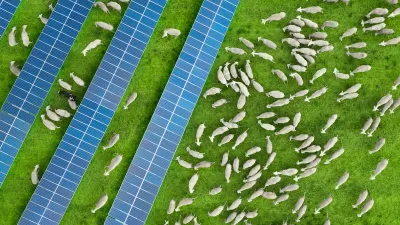Can sustainable development be achieved via a technology-oriented or human behavior-oriented path? Or should we be seeking a more integrated solution?
 For many years, government agencies, research labs, environmental organizations, neighborhood councils and others have worked toward sustainable development; the reconciliation of economic, social and ecological interests. However, the recent United Nations Earth Summit in Johannesburg revealed that although much has been discussed in this regard, relatively little has been achieved. 1
For many years, government agencies, research labs, environmental organizations, neighborhood councils and others have worked toward sustainable development; the reconciliation of economic, social and ecological interests. However, the recent United Nations Earth Summit in Johannesburg revealed that although much has been discussed in this regard, relatively little has been achieved. 1
The majority of sustainable development efforts fall into two main categories—technology-oriented and behavior-oriented. The former promises that high-efficiency technologies will mitigate unsustainable externalities. Thus disencumbered, people will not need to change their behavior, or at least they will not need to make heroic choices. In contrast, the latter argues that technology has too often proved to be a false promise. Heroic choices, according to this perspective, are therefore unavoidable if we are serious about achieving sustainability. Related vocabularies range from modern to antimodern, GMOs to eco-farming, technophilic to technophobic, and back-to-the-roots to high-tech. Advocates of both camps claim to serve sustainability, which relegates the public into a conceptual babel as depicted poignantly by Hellman (Figure 1). 2
Some remarkably successful cases, however, have managed to let technology and behavior co-evolve. For example, the Belgian city of Hasselt narrowed an inner city traffic artery and planted 400 trees in the resulting open space. Additionally, the city radically modernized and increased the frequency of their bus fleet and made all bus rides free. Consequently, the number of bus users increased eightfold. The point is that Hasselt’s success was neither due to vastly more efficient technologies, nor to resounding awareness campaigns. Rather, new infrastructure (i.e. urban technologies) enabled people to behave sustainably without making heroic choices.
Some transportation planners feel their job is to plan tree-lined sidewalks in order to encourage people to walk. Yet they often base their decisions on the assumptions that walking is the proper solution to traffic problems and people will want to walk if they are provided pedestrian-friendly environments. But what if people would rather ride cable cars throughout the city?
The great Egyptian architect Hassan Fathy came across similar unwarranted assumptions. His bio-regionally adapted houses provided cool winds and many other canny amenities. However, residents sabotaged all these fabulous features because they "wanted something modern."3
This lesson also applies to urban design. People determine the success of urban technologies via "pedicracy." That is, they vote with their feet by using or not using particular infrastructure. Thus, planners should step back if they want to have a hand in creating technologies that support convenient and sustainable behavior. Planners should act as students and put people in the designer's seat and allow users to design urban technologies that will serve as an appropriate and constructive foundation for their behavior.
From this viewpoint, the discrete choice between smart technologies and heroic choices, as implied in the conventional sustainability discourse, appears as a false alternative. Instead of choosing between them, it behooves us to embrace them both and harness the potentials of a strategic co-evolution between technology and behavior.
1 United Nations General Assembly Fifty-fifth session. (2001). Ten-year review of progress achieved in the implementation of the outcome of the United Nations Conference on Environment and Development (Document A/RES/55/199).
2 Hellman. (2002). Eco-Bible versus Techno-Bible (Graphics). Built Environment, 28(1), 4.
3 Sachs, S. (2000). Arts abroad; Honoring a visionary if not his vision. New York Times, April 4, 2000, The Arts / Cultural Desk.
Ralf Brand is a Ph.D. candidate in Regional Planning at the University of Texas at Austin. He has held professional and academic positions in the field of sustainable development and is currently working on a dissertation about "the Co-evolution of technology and behavior toward sustainable development." His website is http://www.b-r-a-n-d.de.

Coming Soon to Ohio: The Largest Agrivoltaic Farm in the US
The ambitious 6,000-acre project will combine an 800-watt solar farm with crop and livestock production.

Pennsylvania Mall Conversion Bill Passes House
If passed, the bill would promote the adaptive reuse of defunct commercial buildings.

U.S. Supreme Court: California's Impact Fees May Violate Takings Clause
A California property owner took El Dorado County to state court after paying a traffic impact fee he felt was exorbitant. He lost in trial court, appellate court, and the California Supreme Court denied review. Then the U.S. Supreme Court acted.

Dallas Surburb Bans New Airbnbs
Plano’s city council banned all new permits for short-term rentals as concerns about their impacts on housing costs grow.

Divvy Introduces E-Bike Charging Docks
New, circular docks let e-bikes charge at stations, eliminating the need for frequent battery swaps.

How Freeway Projects Impact Climate Resilience
In addition to displacement and public health impacts, highway expansions can also make communities less resilient to flooding and other climate-related disasters.
City of Costa Mesa
Licking County
Barrett Planning Group LLC
HUD's Office of Policy Development and Research
Mpact Transit + Community
HUD's Office of Policy Development and Research
Tufts University, Department of Urban and Environmental Policy & Planning
City of Universal City TX
ULI Northwest Arkansas
Write for Planetizen
Urban Design for Planners 1: Software Tools
This six-course series explores essential urban design concepts using open source software and equips planners with the tools they need to participate fully in the urban design process.
Planning for Universal Design
Learn the tools for implementing Universal Design in planning regulations.
























